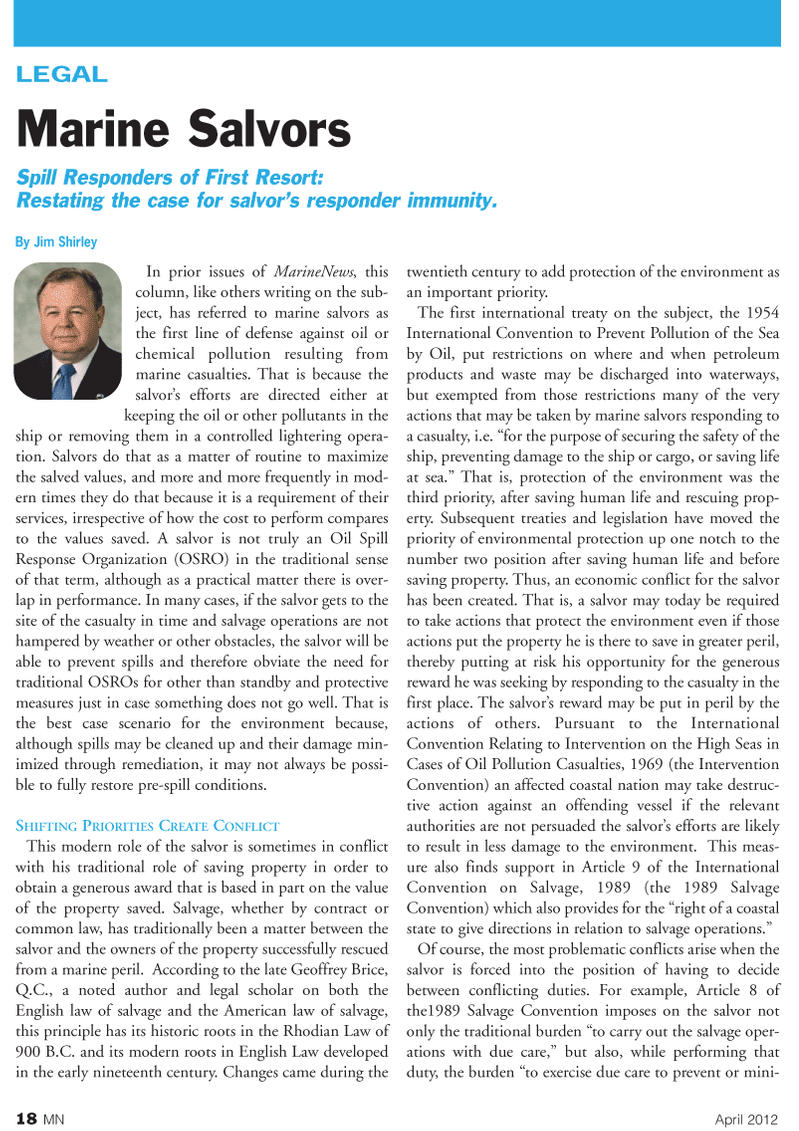
Page 18: of Marine News Magazine (April 2012)
Offshore Service Operators
Read this page in Pdf, Flash or Html5 edition of April 2012 Marine News Magazine
18MNApril 2012In prior issues of MarineNews , thiscolumn, like others writing on the sub-ject, has referred to marine salvors as the first line of defense against oil orchemical pollution resulting from marine casualties. That is because the salvors efforts are directed either at keeping the oil or other pollutants in theship or removing them in a controlled lightering opera- tion. Salvors do that as a matter of routine to maximize the salved values, and more and more frequently in mod- ern times they do that because it is a requirement of their services, irrespective of how the cost to perform compares to the values saved. A salvor is not truly an Oil Spill Response Organization (OSRO) in the traditional sense of that term, although as a practical matter there is over- lap in performance. In many cases, if the salvor gets to the site of the casualty in time and salvage operations are not hampered by weather or other obstacles, the salvor will be able to prevent spills and therefore obviate the need for traditional OSROs for other than standby and protective measures just in case something does not go well. That is the best case scenario for the environment because, although spills may be cleaned up and their damage min-imized through remediation, it may not always be possi- ble to fully restore pre-spill conditions. SHIFTINGPRIORITIESCREATE CONFLICTThis modern role of the salvor is sometimes in conflict with his traditional role of saving property in order to obtain a generous award that is based in part on the value of the property saved. Salvage, whether by contract or common law, has traditionally been a matter between the salvor and the owners of the property successfully rescued from a marine peril. According to the late Geoffrey Brice, Q.C., a noted author and legal scholar on both theEnglish law of salvage and the American law of salvage, this principle has its historic roots in the Rhodian Law of 900 B.C. and its modern roots in English Law developed in the early nineteenth century. Changes came during the twentieth century to add protection of the environment as an important priority. The first international treaty on the subject, the 1954 International Convention to Prevent Pollution of the Sea by Oil, put restrictions on where and when petroleum products and waste may be discharged into waterways, but exempted from those restrictions many of the very actions that may be taken by marine salvors responding to a casualty, i.e. for the purpose of securing the safety of the ship, preventing damage to the ship or cargo, or saving life at sea.? That is, protection of the environment was the third priority, after saving human life and rescuing prop- erty. Subsequent treaties and legislation have moved the priority of environmental protection up one notch to the number two position after saving human life and before saving property. Thus, an economic conflict for the salvor has been created. That is, a salvor may today be required to take actions that protect the environment even if those actions put the property he is there to save in greater peril, thereby putting at risk his opportunity for the generous reward he was seeking by responding to the casualty in the first place. The salvors reward may be put in peril by the actions of others. Pursuant to the International Convention Relating to Intervention on the High Seas in Cases of Oil Pollution Casualties, 1969 (the Intervention Convention) an affected coastal nation may take destruc- tive action against an offending vessel if the relevant authorities are not persuaded the salvors efforts are likely to result in less damage to the environment. This meas- ure also finds support in Article 9 of the International Convention on Salvage, 1989 (the 1989 Salvage Convention) which also provides for the right of a coastal state to give directions in relation to salvage operations.? Of course, the most problematic conflicts arise when the salvor is forced into the position of having to decide between conflicting duties. For example, Article 8 of the1989 Salvage Convention imposes on the salvor not only the traditional burden to carry out the salvage oper- ations with due care,? but also, while performing that duty, the burden to exercise due care to prevent or mini- LEGALBy Jim ShirleyMarine SalvorsSpill Responders of First Resort: Restating the case for salvors responder immunity.

 17
17

 19
19
